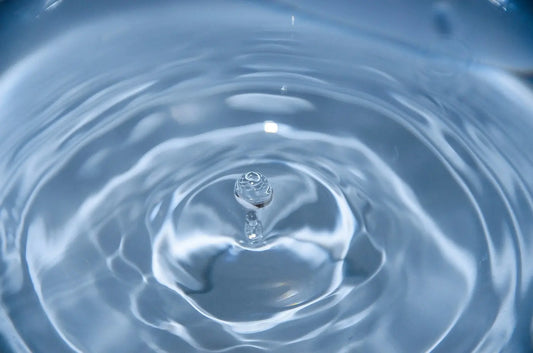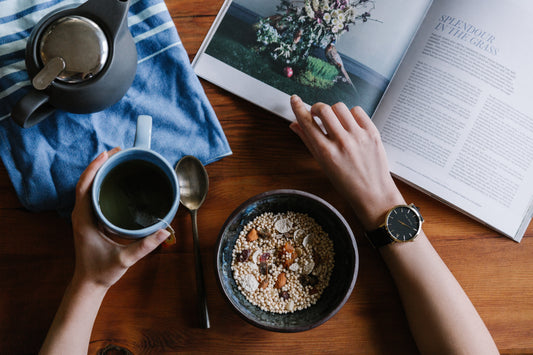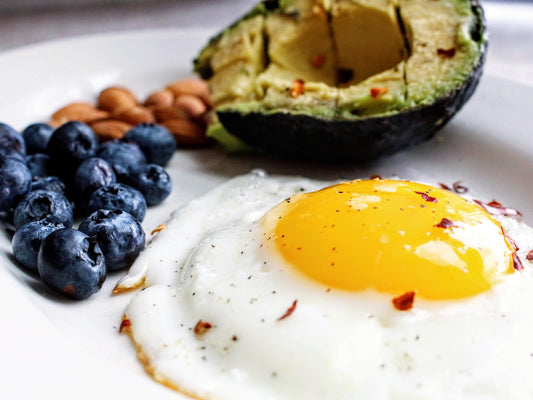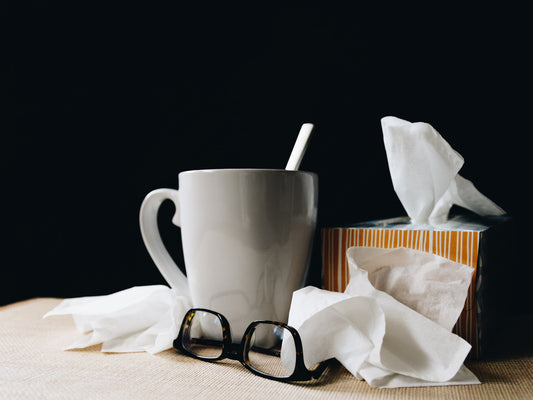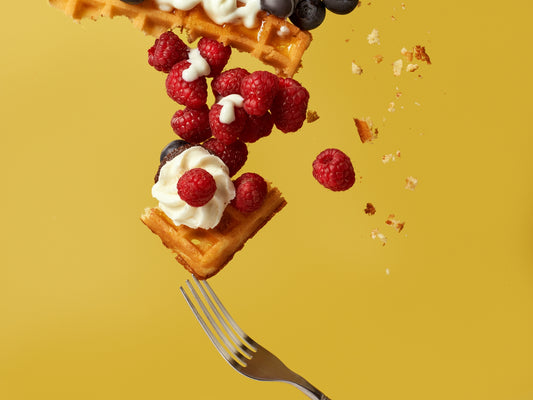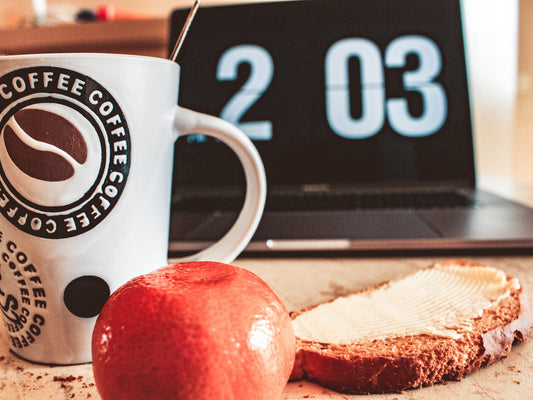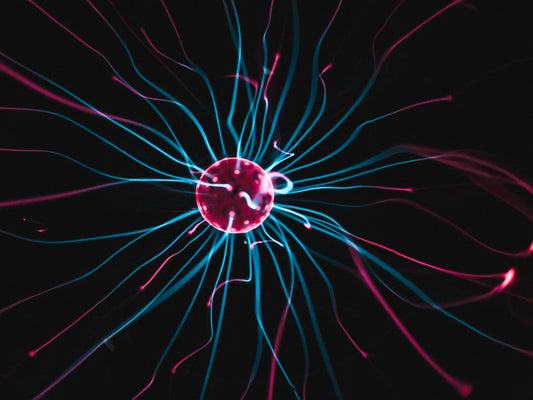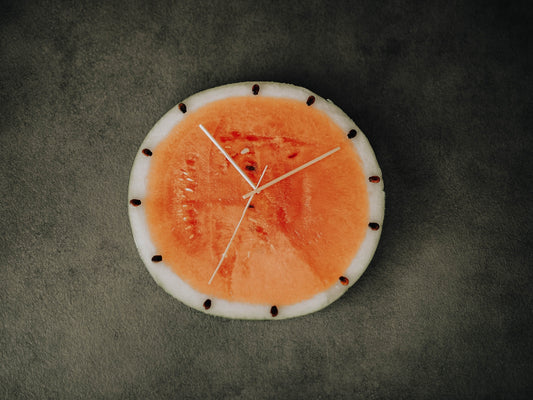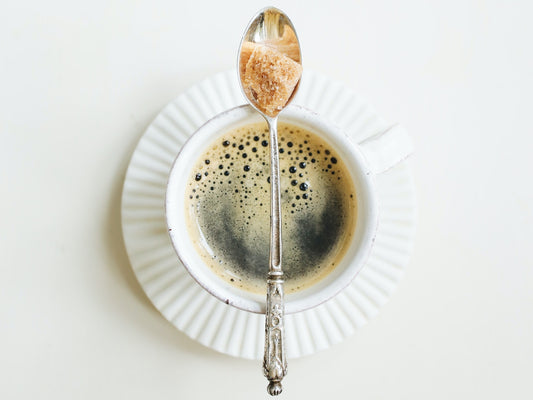Fruit juice in general is touted as a healthy source of vitamins and minerals, with minerals being a key part of proper hydration [1]. Cranberry juice in particular is often suggested to have a number of fantastic health properties, even beyond the rehydrating ability of other fruit juices [2]. We had a look at the science behind all these claims, and here’s what we found.
What is fruit juice, anyway?

First of all, let’s talk juice. Pure fruit juice is what you get when you squeeze fruit and extract its liquid, which can then be refined and processed in various ways. The juice may be sweetened with added sugar or supplemented with vitamins, for example. But let’s take a step back and think about what the juice actually is.
Squeezing fruit crushes its cells, releasing the liquid inside them. Fruits, like other living things, have lots of chemical reactions going on within their cells. The chemical reactions in fruits lead to the natural synthesis of sugars, vitamins, and compounds such as proanthocyanidins, which give fruits their color [1]. The cells also contain lots of great rehydrating minerals such as potassium, sodium, chloride, and calcium, which are important for proper and healthy hydration. So yes, cranberry juice and other fruit juices can be part of staying hydrated.
So is cranberry juice good for hydration?
However, drinking cranberry juice might not be the healthiest way to stay hydrated. Cranberry juice, much like other fruit juices, contains a lot of sugar previously stored within the fruit cells. A leading commercial brand of 100% cranberry juice with “no added sugar” still contains 18 grams of carbohydrates per cup (240 mL), of which 9 grams are sugar [3]. A cup of this juice contains 60 calories [3]. For context, the same volume of Coca Cola would contain 101 calories [4] – so don’t consider cranberry juice something you can just swig without concern for calories.
What about other fruit juices?
Additionally, most fruit juice does contain added sugar, ramping up the calories even further. For example, orange juice can contain around 470 calories per liter, compared to about 350 calories per liter of skimmed milk [5]. And because of the way fruit juice is extracted, the sugars are more readily absorbed by the gut. This means juice can actually have a worse effect on your metabolism than if you just ate the same amount of fruit.
In fact, a team at the University of Cambridge, UK, found that 100% fruit juice was associated with a worse “metabolic score” than solid sugars, or even alcoholic beverages [6]. They took waist size, blood pressure, and cholesterol levels as markers of this metabolic score; so if you want to keep yourself hydrated, but keep the waist size from ballooning, drinking lots of cranberry and other fruit juices might not be the best way to go.
This was also supported by a study suggesting that in countries like Mexico where people consume lots of fruit juice, they are more likely to exceed World Health Organization (WHO) recommendations for daily free sugar consumption [7]. WHO is a large international body concerned with keeping us all healthy, and compiled lots of evidence from a range of experts to produce these recommendations.
Does cranberry juice have other health benefits?

The other commonly accepted benefits of cranberry juice aren’t as clear-cut as they’re often presented [8][9]. Many women are told that urinary tract infections can be helped by drinking copious amounts of cranberry juice, or by taking concentrated capsules of cranberry extracts [10][11][12]. However, the scientific literature simply doesn’t support this. Researchers have tried to identify what the responsible chemical compounds could be [9], and many theories of how cranberry juice might stimulate the immune system or thwart bacteria have been proposed. However, large studies have failed to show that cranberries help reduce or prevent these infections in either older [11] or younger [12] women.
Some have suggested that the way these experiments are being done and compared might be influencing why there doesn’t seem to be a clear answer [8]. But for now at least, there just isn’t a strong body of evidence to support cranberry juice having an antibacterial effect.
The good with the bad
The evidence for other purported benefits of cranberry juice, such as for the heart [1], is similarly lacking. Meanwhile, research does show that while cranberry juice can make some types of kidney stones better, it can make other types worse [10][13]! Additionally, some suggest the complex compounds present in cranberry juice might adversely affect certain medications such as warfarin, leading to potentially dangerous complications [14]. So, cranberry juice’s possible health benefits beyond simple hydration is really a mixed bag.
What about minerals in cranberry juice [3]? How can they actually hydrate you? Well, the cells in your body use electrical charges to do their work and communicate among themselves. Much like batteries, cells need electrically charged minerals, known as electrolytes, to power their work. And they need those electrolytes to be in the right concentration, both inside and outside the cells. When you lose body fluids, whether through normal processes like sweating and urination or by being sick with vomiting or diarrhea, you lose both water and electrolytes.
If you replace lost fluids with plain water, you can end up diluting essential electrolytes like sodium until your cells can’t function properly. For proper hydration you need both electrolytes and water. So the minerals in cranberry juice can help keep you hydrated, but at the cost of a high sugar intake.
Are there healthier alternatives cranberry juice for hydration?

What are some less calorific and more hydrating alternatives to cranberry juice? Several studies have looked at how fruit juices stack up to alternatives for hydration. One study compared orange juice, milk, and an electrolyte solution. It found that although all were better than water alone for hydration, orange juice was less effective at maintaining hydration than milk or the electrolyte solution [5]. We’ve already mentioned the calorific nature of fruit juice (orange juice 470 kcal/liter) and milk (350 kcal/liter), but the electrolyte solution was significantly less calorific than either, with just 80 kcal/liter [5]. Another smaller study similarly found that an apple juice-sparkling water mix was less rehydrating after exercise than a carbohydrate-electrolyte drink, and both were better than water alone [15].
So the evidence does appear to suggest that although fruit juice is hydrating, it’s not the most energy-efficient way to stay hydrated. However, it is worth mentioning that one study found children with mild gastroenteritis (vomiting and diarrhea) were better rehydrated with a fruit juice mix than with oral rehydration solution [16]. Of course, the fact that mildly dehydrated children preferred the extra sugary fruit juice mix, and so drank more of it, is of little surprise to anyone who’s cared for a sick child. The scientists in the study recognize that oral rehydration solution remains the gold standard of treatment in more severe dehydrated children.
Overall, our study of some of the literature around cranberry juice and its supposed magical abilities revealed to us that yes, it will hydrate you. But while it’s not clear it will help you stop getting urinary tract infections, it will load you up with sugar and calories. There are lower calorie, more effective hydrating alternatives available out there to keep you in top form.
Fruit juices, such as cranberry juice, can form part of a balanced and varied diet. Please consult your health professional for more advice on vitamins, minerals, sugar, calories and nutrition in general.
Please seek advice from your health professional before making any changes to your diet, especially if they have previously advised you on your diet or fluid intake.
References
[1] Hyson, D.A., 2015. A review and critical analysis of the scientific literature related to 100% fruit juice and human health. Advances in Nutrition, 6(1), pp.37-51.
[2] Blumberg, J.B., Camesano, T.A., Cassidy, A., Kris-Etherton, P., Howell, A., Manach, C., Ostertag, L.M., Sies, H., Skulas-Ray, A. and Vita, J.A., 2013. Cranberries and their bioactive constituents in human health. Advances in Nutrition, 4(6), pp.618-632.
[3] https://www.oceanspray.com/Products/Juices/By-Type/100-Percent-Juice/Pure-Cranberry (as of 14/09/2019)
[4] https://www.coca-cola.co.uk/drinks/coca-cola/coca-cola (as of 14/09/2019)
[5] Ronald J Maughan, Phillip Watson, Philip AA Cordery, Neil P Walsh, Samuel J Oliver, Alberto Dolci, Nidia Rodriguez-Sanchez, Stuart DR Galloway, A randomized trial to assess the potential of different beverages to affect hydration status: development of a beverage hydration index, The American Journal of Clinical Nutrition, Volume 103, Issue 3, March 2016, Pages 717–723,
[6] O'Connor, L., Imamura, F., Brage, S., Griffin, S.J., Wareham, N.J. and Forouhi, N.G., 2018. Intakes and sources of dietary sugars and their association with metabolic and inflammatory markers. Clinical Nutrition, 37(4), pp.1313-1322.
[7] Guelinckx, I., Ferreira-Pêgo, C., Moreno, L.A., Kavouras, S.A., Gandy, J., Martinez, H., Bardosono, S., Abdollahi, M., Nasseri, E., Jarosz, A. and Ma, G., 2015. Intake of water and different beverages in adults across 13 countries. European journal of nutrition, 54(2), pp.45-55.
[8] Liska, D.J., Kern, H.J. and Maki, K.C., 2016. Cranberries and urinary tract infections: how can the same evidence lead to conflicting advice?. Advances in Nutrition, 7(3), pp.498-506.
[9] Liu, H., Garrett, T.J., Su, Z., Khoo, C. and Gu, L., 2017. UHPLC-Q-Orbitrap-HRMS-based global metabolomics reveal metabolome modifications in plasma of young women after cranberry juice consumption. The Journal of nutritional biochemistry, 45, pp.67-76.
[10] Kessler, T., Jansen, B. and Hesse, A., 2002. Effect of blackcurrant-, cranberry-and plum juice consumption on risk factors associated with kidney stone formation. European journal of clinical nutrition, 56(10), p.1020.
[11] Gunnarsson, A.K., Gunningberg, L., Larsson, S. and Jonsson, K.B., 2017. Cranberry juice concentrate does not significantly decrease the incidence of acquired bacteriuria in female hip fracture patients receiving urine catheter: a double-blind randomized trial. Clinical interventions in aging, 12, p.137.
[12] Barbosa-Cesnik, C., Brown, M.B., Buxton, M., Zhang, L., DeBusscher, J. and Foxman, B., 2011. Cranberry juice fails to prevent recurrent urinary tract infection: results from a randomized placebo-controlled trial. Clinical infectious diseases, 52(1), pp.23-30.
[13] Frassetto, L. and Kohlstadt, I., 2011. Treatment and prevention of kidney stones: an update. American family physician, 84(11), p.1234.
[14] Srinivas, N.R., 2013. Cranberry juice ingestion and clinical drug-drug interaction potentials; review of case studies and perspectives. Journal of pharmacy & pharmaceutical sciences, 16(2), pp.289-303.
[15] Shirreffs, S.M., Aragon-Vargas, L.F., Keil, M., Love, T.D. and Phillips, S., 2007. Rehydration after exercise in the heat: a comparison of 4 commonly used drinks. International journal of sport nutrition and exercise metabolism, 17(3), pp.244-258.
[16] Freedman, S.B., Willan, A.R., Boutis, K. and Schuh, S., 2016. Effect of dilute apple juice and preferred fluids vs electrolyte maintenance solution on treatment failure among children with mild gastroenteritis: a randomized clinical trial. Jama, 315(18), pp.1966-1974.













